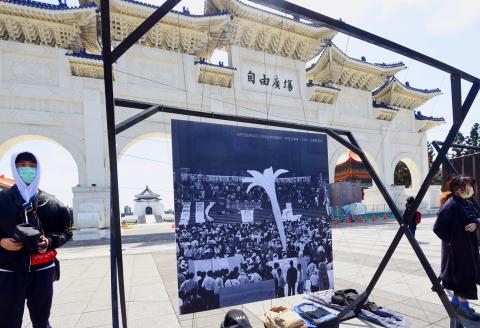Representatives from several groups yesterday gathered in front of the main gate of Taipei’s Liberty Square to mark the 30th anniversary of the beginning of the Wild Lily student movement.
Organizers from the groups, including the National Students’ Union of Taiwan (NSUT), the Taiwan Youth Association for Democracy, the Taiwan Citizen Front and the Economic Democracy Union, carried a banner that read: “Fellow citizens, how can we tolerate the oppression of 700 emperors again?”
The banner is a replica of one held by student demonstrators from National Taiwan University in 1990, NSUT president Tan Ko-him (陳佑維) said.

Photo: Chien Jung-fong, Taipei Times
“Although at the time martial law had already been lifted in Taiwan, an atmosphere of ‘unfreedom’ still permeated the air,” he said.
The movement’s participants “became a force that pushed the island forward,” he said.
“Today, 30 years later, we mention the Wild Lily [movement] again not just to commemorate history,” he said.
“After breaking free from the oppression of 700 emperors, reform is not yet complete,” the groups said in a statement, which the members read aloud.
They also listed several demands for the lawmakers elected on Jan. 11.
These included a call for the Democratic Progressive Party not to use its legislative majority to “block the discussion of diverse opinions.”
Other parties, on the other hand, should “pursue real changes to the content of bills,” the groups said.
They also demanded a reform of the Legislative Yuan’s electoral system.
The current system “overly protects” the two major political parties, and is “not conducive to the establishment of a pluralistic democratic system,” they said.
Chou Ko-jen (周克任), one of the participants in the Wild Lily movement, said that the atmosphere at Liberty Square today was different from 1990.
“Back then, as soon as we came to this place and reporters arrived, riot police began to prepare,” he said.
Many issues remain unresolved, he said, adding that motivating civil servants at the local level to enforce the law is crucial to Taiwan’s competitiveness.

A small number of Taiwanese this year lost their citizenship rights after traveling in China and obtaining a one-time Chinese passport to cross the border into Russia, a source said today. The people signed up through Chinese travel agencies for tours of neighboring Russia with companies claiming they could obtain Russian visas and fast-track border clearance, the source said on condition of anonymity. The travelers were actually issued one-time-use Chinese passports, they said. Taiwanese are prohibited from holding a Chinese passport or household registration. If found to have a Chinese ID, they may lose their resident status under Article 9-1

Taiwanese were praised for their composure after a video filmed by Taiwanese tourists capturing the moment a magnitude 7.5 earthquake struck Japan’s Aomori Prefecture went viral on social media. The video shows a hotel room shaking violently amid Monday’s quake, with objects falling to the ground. Two Taiwanese began filming with their mobile phones, while two others held the sides of a TV to prevent it from falling. When the shaking stopped, the pair calmly took down the TV and laid it flat on a tatami mat, the video shows. The video also captured the group talking about the safety of their companions bathing

PROBLEMATIC APP: Citing more than 1,000 fraud cases, the government is taking the app down for a year, but opposition voices are calling it censorship Chinese Nationalist Party (KMT) Chairwoman Cheng Li-wun (鄭麗文) yesterday decried a government plan to suspend access to Chinese social media platform Xiaohongshu (小紅書) for one year as censorship, while the Presidential Office backed the plan. The Ministry of the Interior on Thursday cited security risks and accusations that the Instagram-like app, known as Rednote in English, had figured in more than 1,700 fraud cases since last year. The company, which has about 3 million users in Taiwan, has not yet responded to requests for comment. “Many people online are already asking ‘How to climb over the firewall to access Xiaohongshu,’” Cheng posted on

A classified Pentagon-produced, multiyear assessment — the Overmatch brief — highlighted unreported Chinese capabilities to destroy US military assets and identified US supply chain choke points, painting a disturbing picture of waning US military might, a New York Times editorial published on Monday said. US Secretary of Defense Pete Hegseth’s comments in November last year that “we lose every time” in Pentagon-conducted war games pitting the US against China further highlighted the uncertainty about the US’ capability to intervene in the event of a Chinese invasion of Taiwan. “It shows the Pentagon’s overreliance on expensive, vulnerable weapons as adversaries field cheap, technologically